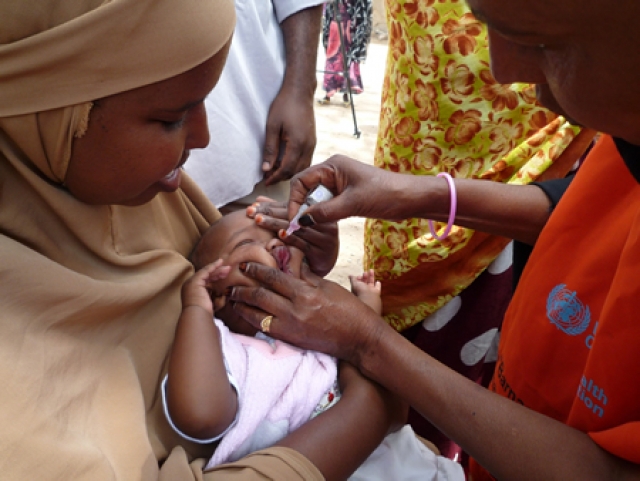WHO reports on Polio Eradication in the African Region in 2011
 Brazzaville, 23 May 2012 -- The number of wild poliovirus (WPV) cases in the World Health Organization (WHO) African Region dropped from 657 in 2010 to 350 in 2011 representing a 47% decline.
Brazzaville, 23 May 2012 -- The number of wild poliovirus (WPV) cases in the World Health Organization (WHO) African Region dropped from 657 in 2010 to 350 in 2011 representing a 47% decline.
This is reflected in the 2011 report on "Eradicating Polio in the African Region" released on Wednesday in Brazzaville by the WHO Regional Office for Africa.
The report says that Nigeria, Africa's only polio endemic country, reported 62 WPV cases in 2011, representing a three-fold increase over the 21 cases reported the previous year.
A sharp increase in cases was also reported in Chad which recorded 132 cases in 2011 compared to 26 in 2010. While Angola reported five cases in 2011 compared to 33 in 2010, the Democratic Republic of Congo (DRC) reported 93 cases in 2011, down from 100 cases in 2010, representing a slight decline. All three countries have been designated as "re-established transmission countries" – a term used for countries where polio persists for over 12 months.
According to the report, several other countries in the region also suffered outbreaks mainly due to importations from Nigeria. For example, in West Africa, there were a total of 51 cases, all genetically linked to WPV origins in northern Nigeria. Most of these cases (36) were detected in Cote d'Ivoire, with smaller numbers in Guinea-Conakry (3), Mali (7), and Niger (5).
The report, which also confirmed the detection of WPV type 1 cases in Kenya, the Republic of Congo and Gabon, says that, generally, a number of countries reported an increase in both the number and geographical distribution of WPV cases. Although eight countries experienced WPV importations in 2011, all new outbreaks were interrupted within 6 months in all but one of them, Mali. About 530 million doses of the life-saving oral polio vaccines (OPV) were administered to people in 30 countries during the year under review. Sixteen countries in the region attained 90 % national coverage with the required doses of OPV in 2011. All in all, 34 countries in the region continued to remain polio-free.
The report attributes the success recorded in the polio eradication drive in 2011 to high level political commitment as evidenced by the declaration of personal support for polio eradication by the leaders of the four priority countries - Angola, Chad, DRC and Nigeria. Also, that year, health ministers of the WHO African Region declared polio a national public health emergency paving the way for a response that allowed for the leveraging of additional resources.
Support by WHO and other health partners was also key. Financial contributions by partners totalled more than US$233 709 925, with the Bill and Melinda Gates Foundation providing 57% of the amount. Angola, Chad, DRC and Nigeria combined contributed more than US$31million to finance polio eradication activities in their respective countries.
The report also lists some of the challenges facing polio eradication in the African Region. These include: inadequate cold chain, vaccine shortage, inadequate cross border collaboration, insecurity and resistance in some areas and political activities such as elections which have hindered polio eradication campaigns. Others are the sub-optimal use of new technologies and the emergence of vaccine-derived polioviruses to which populations with low levels of vaccination coverage are particularly vulnerable.
Concluding, it says that 'WHO would continue to assist Member States to achieve the milestones set out in the 2012-2013 global emergency action plan; work with partners to coordinate and facilitate the final push towards polio eradication; assist with resource mobilization; support Member States to optimize the use of new technologies to support programme implementation, and support priority countries (Angola, Chad, DRC and Nigeria) to implement their emergency plans.
_________________________________________________________________________
For further information:
Media contact: Samuel Ajibola; tel + 47-241- 39378 E-mail: ajibolas [at] afro.who.int
Technical contact: Dr Rui Vaz tel: + 47-241- 39238 E-mail: vazr [at] afro.who.int


